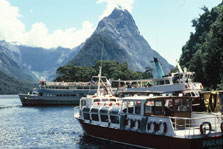Date of submission: 27 June 2007
Submitted to: info@nztourismstrategy.com
The New Zealand Conservation Authority is pleased to provide some commentary on the draft NZ Tourism Strategy 2015.
Why the NZCA is submitting
The New Zealand Conservation Authority (NZCA) is a statutory body established by section 6A of the Conservation Act 1987. Its members are appointed by the Minister of Conservation on the nomination or recommendation of four specified bodies (4 members), after consultation with three specified Ministers of the Crown (5 members) and after the receipt of public nominations (4 members). This process ensures that a wide range of perspectives contribute to the advice provided and decisions made by the NZCA. The functions of the NZCA are centred on policy and planning which impacts on the administration of conservation areas managed by the Department of Conservation, and on the investigation of any conservation matter it considers is of national importance. The NZCA has the power to advocate its interests at any public forum and in any statutory planning process.
Specifically the NZCA has the statutory role in regards to public conservation lands of approving Conservation Management Strategies and National Park Management Plans. The NZCA accordingly has a keen interest in the Tourism Strategy’s stated objectives and actions in regard to their projected outcomes in regards to those public conservation lands.
General comment

Tourist boats, Milford Sound, Fiordland
National Park
It is noticeable that the words “conservation” and “environment” are peppered through the document and the NZCA congratulates the draftees of the strategy for being upfront about the critical dependency the Tourism industry has on the protection and sustainability of New Zealand’s natural environment.
Specific comments
Page 13, second bullet – “the natural environment will be protected and enhanced, and the environmental footprint of the tourism sector will continue to shrink”
This aspiration is good although carbon neutrality would be an even better one. But is the environmental footprint "continuing" to shrink? It may be correct for many individual businesses, but it is doubtful whether it would be true for the industry overall. Therein lies the fundamental dilemma of growth!
Page 4 – “The challenge”
The Minister’s challenge of being a “global leader in sustainability” is a more visionary approach than that of the draft strategy. The NZCA supports the Minister’s vision. Point two on page 15 refers to this sustainable approach but this needs to be incorporated into the “actions” of the Strategy, as the actions are key to the delivery of these statements.
Chapter 7 – “The tourism sector takes a leading role in protecting & enhancing the environment”
Under the “Visitor management on conservation lands” on page 42 the Department of Conservation’s strategic direction is quoted. It is important not to overlook what the legislation says about the primacy of protection.
Page 39, second to last paragraph
The NZCA is concerned about the “increasing commercial use of conservation areas”. The “natural” environment needs to be preserved; it would prefer commercialism is not at the expense of naturalness.
Page 45, 7.4.22.
This should address more than just “visitor interests”, i.e. impacts on public conservation land also need to be addressed. The Department of Conservation must also have the capacity to so engage with other stakeholder interests.
Carbon footprint
There is an emphasis on carbon footprint in the Strategy, and that's important. However, currently the Government does not seem to accept the validity of peak oil arguments. Long haul aircraft depend on oil. So even if we keep the consumers happy with our image, and carbon footprint arguments are assuaged, the Strategy should at least contemplate the possibility that it may get very expensive to fly to New Zealand from many destinations. Consumer preferences could be adversely affected by the oil related cost of travel to New Zealand.
Page 43, 7.3, second bullet and 7.4.3. The use of "offset" rather than "reduce" may be deliberate, yet over the page the action points relate to reduction of carbon emissions. Perhaps clarification is needed on whether “offsetting” or “reducing” carbon emissions is sought? With regard to the action, the NZCA sees this as an urgent need.
Other points
Local government are also conservation managers, this role isn’t exclusively the Department of Conservation’s.
The NZCA is pleased to see that 8.4.2 acknowledges the need to protect iconic vistas.